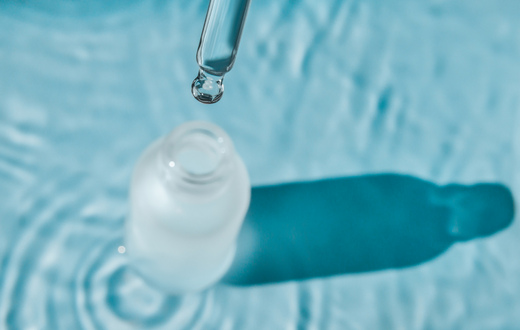Your needs: to inspect the quality of a hyaluronic acid-based wrinkle filler
Natural in origin, hyaluronic acid is an active ingredient used to make wrinkle filling gels as well as some other cosmetic products thanks to its effects on skin elasticity, skin tone and skin firmness.
As producers using hyaluronic acid in your products, you are looking to optimize your procedure thanks in part to regular inspections of your products.

Our solution: to quickly provide you with reliable techniques allowing you to evaluate the quality of your hyaluronic acid-based products
As an independent laboratory situated in Dijon, France, FILAB has been active in the cosmetics and Medical Device industries for over 30 years, carrying out compliance testing and inspecting raw materials.
From conception to production, all the way to a product being put on the market, FILAB has a wide range of useful analytical tools (ICP-MS, ICP-AES, GC-MS, IC…) making it possible to study your hyaluronic acid-based products and provide the following services :
- Chemical analysis, determination of hyaluronic acid, BDDE and lidocaine contents
- Stability testing in accordance with given conditions to evaluate the lifespan and storage conditions of hyaluronic acid-based products
- Additive analysis
- Heavy metal analysis (under ISO 17025 accreditation)
- Detection of impurities
- Compatibility testing (E&Ls, container/contents interactions)
- Development of analytical methods
Ensuring a quick turnaround for your requests, FILAB laboratory is able to support companies from the cosmetics and healthcare industry in resolving their complex problems and by assisting with R&D projects (literature reviews, scope statements, research into substitutions, synthesis…).
FAQ
Hyaluronic acid is also used in the medical industry. It is used in particular as a filler for filling treatments and for the treatment of certain ocular and articular affections.
Check the quality and purity of the hyaluronic acid used in medical products.
Evaluate the concentration of hyaluronic acid in a medical product to ensure that it meets the required specifications.
Understand the physical and chemical properties of hyaluronic acid: its viscosity, its stability and its filling effect. All these properties allow for its optimization in medical products.
Evaluate the effectiveness of different types of hyaluronic acid in formulation tests to treat specific conditions.
Thus, hyaluronic acid analysis can help a medical manufacturer to ensure that its products comply with quality and safety standards, to optimize their formulation for optimal results and to evaluate their effectiveness in treating different conditions.
Hyaluronic acid is a very popular molecule in the cosmetic industry because of its moisturizing and anti-aging properties. A cosmetic industrialist has to analyze hyaluronic acid to...
Verify the quality and purity of the hyaluronic acid used in the formulation of a cosmetic product.
Determine the concentration of hyaluronic acid in a cosmetic product to ensure that it meets the required specifications.
Evaluate the effectiveness of different types of hyaluronic acid, including hyaluronic acid in formulation tests.
Understand the physical and chemical properties of hyaluronic acid such as its molecular weight or size distribution. Thus, the cosmetic industrial is able to optimize its formulation in a cosmetic product.
In other words, the analysis of hyaluronic acid can help a cosmetic manufacturer to ensure that its products contain the desired active ingredient and to optimize their formulation for optimal results.








